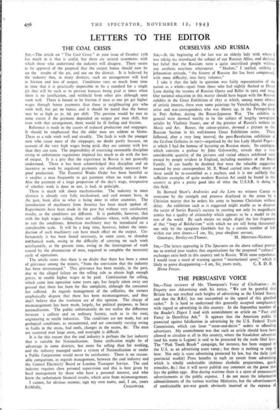OURSELVES AND RUSSIA
SIR,—At the beginning of the last war an elderly lady with whom I was taking tea introduced the subject of our Russian Allies, and declared her belief that the Russians were a quite uncivilised people without any aesthetic reactions whatsoever. " Madam," I replied, striking a Johnsonian attitude, " the history of Russian Art has been compressed, with some difficulty, into forty volumes."
I take it that the lady in question was fairly representative of the nation as a whole—apart from those who had nightly flocked to Drury Lane during the seasons of Russian Opera and Ballet in 1913 and 1914. Our national education in this matter should have begun with the Russian exhibits in the Great Exhibition of 1851 at which, among many objects of artistic interest, there were some paintings by Vereshchagin, the great artist and war-correspondent who was blown up, in the Petropavlovsk in Port Arthur, during the Russo-Japanese War. The exhibits in general were deemed worthy to be the subject of lengthy newspaper articles by Vladimir Stasov, one of the greatest of Russia's writers on Music and Art. Baxter, the colour-printer, devoted a picture to this Russian Section in his well-known Great Exhibition series. There followed, after a very long interval, the post-Revolution exhibition at the Grafton Galleries in 1917—organised by the late Lady Muriel Paget—. at which I had the honour of lecturing on Russian music. Its catalogue, which contains a preface by John Galsworthy, reveals that a very considerable quantity of the pictures and varied objects exhibited were owned by people resident in England, including members of the Royal Family. It can hardly be doubted that were the valuable suggestion mooted by your correspondent M. E. Wood carried into effect many of these could be re-assembled as a nucleus, and it is not unlikely that sufficient examples of quite modern Russian Art could be found in this country to give a pretty good idea of what the U.S.S.R. is doing in this field.
In Bernard Shaw's Androcles and the Lion we witness Caesar so overcome by the strength and prowess displayed in the arena by a Christian martyr that he orders his army to become Christians without delay. An exhibition such as is suggested might enable us to discover the secret of Soviet Russia's success in creating not only its magnificent armies but a quality of citizenship which appears to be a model to the rest of the world. By such means we might dispel the last fragments of that " bogy of Bolshevism " with which we are still being threatened. not only by the egregious Goebbels but by a certain number of folk within our own shores.—I am, Sir, your obedient servant,


























 Previous page
Previous page